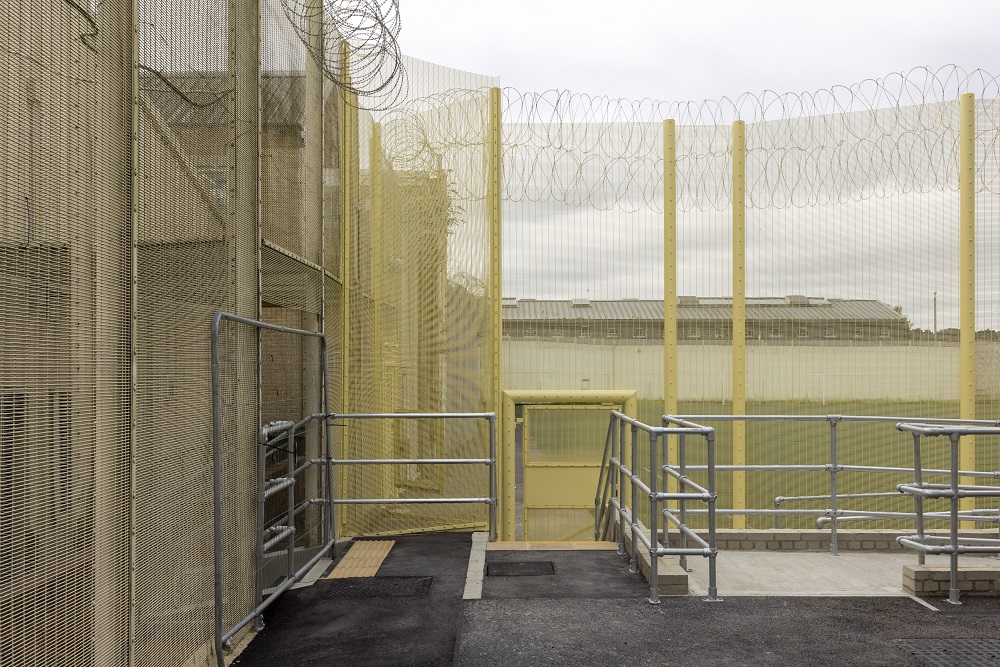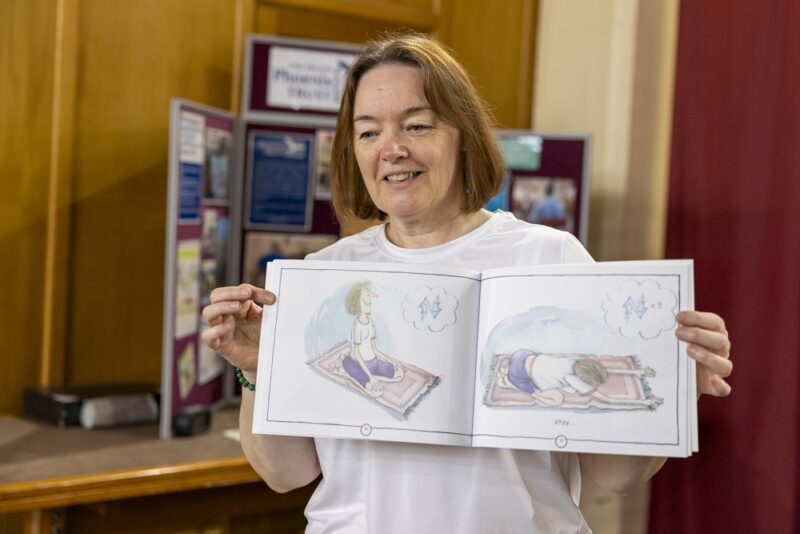 We spent a day with Emma, who teaches yoga and meditation to particularly vulnerable children aged 15-18 in a young offenders institution. The boys have various and complex needs, including neurodiversity, learning disabilities, special educational needs, behavioural problems, and lots of trauma. Some are serving long sentences of 15 years or more.
We spent a day with Emma, who teaches yoga and meditation to particularly vulnerable children aged 15-18 in a young offenders institution. The boys have various and complex needs, including neurodiversity, learning disabilities, special educational needs, behavioural problems, and lots of trauma. Some are serving long sentences of 15 years or more.
Emma arrives with a big bag of yoga mats at a block is made up of 4 wings, each with 12 cells down one side, doors opening out onto a carpeted communal area with a couple of sofas, tables and chairs from which windows look out onto the grounds, including a pond. There’s a staff office on each wing.
Being key-trained, the yoga teacher is able to move around freely, greeting prison officers, staff and the young offenders. She moves from wing to wing to see who’s available for yoga.
On the first wing we visit, officers ask us to come back later as “things have kicked off over lunch and there’s rice and peas everywhere.” At another wing a young person, Daniel*, was waiting with his mat ready for a yoga class, but staff asked us to come back later as there was an incident underway in one of the cells overlooking the yoga space, where staff were trying to ‘talk down’ a young person in the midst of a mental health crisis.
“It’s very challenging,” says Emma. But she deals with every challenge calmly and with friendly good humour.
On the third wing we visit, a group of 3 young offenders are keen to have some time out of their ‘pads’ and join in yoga. Mats are laid out in a semi-circle. A female prison officer joins in too.
The class starts with an invitation to take part in whatever parts you enjoy, but with permission to stop or sit bits out whenever the young person wishes. This is important, explains Emma, to that they don’t feel any compulsion to do things that don’t feel right or any sense of shame if they find things difficult.
To get her students’ attention focused early on Emma gives them a slightly challenging bit of physical coordination – tapping each foot in turn with the opposite hand, first in front of the body and then behind.
There’s laughter as everyone works it out. They then move on to a series of warrior postures and balances, repeated so the young people begin to feel a sense of familiarity and competence.
“I like the physical exercise,” says Rio*.
The sequence then moves into some challenging planks, seated forward bends and twists – until reaching a short period of relaxation and 60 seconds of seated meditation, counting the breath as a focus.
“There needs to be something quite challenging to tire them out before we relax,” says Emma, “or they find it very hard to be still.”
Using a trauma-responsive approach, Emma introduces relaxation and meditation with advice on what to do if the children start to feel overwhelmed or have difficult thoughts: “See if you can tune into the sounds around you, touch the ground with your hands, look at your surroundings.”
In all, they stayed focused for almost the whole 25-minute class, with attention just beginning to break down towards the end when there is some playful throwing of yoga blocks.
“That’s such progress,” says Emma. “Rio couldn’t stay on his mat for 5 minutes without wandering off the first time he came to yoga. Today he stayed for the entire class and he was experimenting with different sitting position to help him in the forward bends. That shows he’s learning to tune into body and respond to what he notices.”
“They all tend to downplay what an achievement it is for them to stay and participate for 20-25 minutes. There aren’t many other activities where they can maintain their focus for that long.
“Although behaviour is always something I need to watch, I’ve never had a situation where I feel I’ve lost control of the group. It’s important that I manage the group dynamic in a way that feels safe for the lads who come along, especially the really quiet, introverted ones.”
One such child is Tom*, who is only resident of the next wing we visit. He has special educational needs and isn’t permitted to mix with other children in the prison (it’s unclear if this is for his safety or theirs.)
Part-way through the 20-minute class a prison officer comes over and offers Tom a waffle and cream just cooked by one of the other young offenders. Emma knows it’s important to allow this little bit of interaction, albeit through a prison officer, so the yoga session pauses while he enjoys his waffle.
Tom struggles with his physical co-ordination but after just 4 yoga sessions he’s really enjoying it and at the end of today’s class he asked to have a yoga mat to practise on his own in his ‘pad’.

The PPT provides free resources for students to use in their ‘pads’ including illustrated books for those who struggle to read.
Emma delivers one to his cell before she leaves the prison and The Prison Phoenix Trust will send DVDs, picture books and other resources for the children to use in this way.
She says: “For some of the children, yoga becomes a priority and they choose it over the gym or football. It might be the only thing they’ll engage with, perhaps because it’s a non-competitive environment. They know they have the option to leave at any time. They can sit down, just be in the space and that’s fine.
“One boy who came for 25 weeks before his release said yoga had a massive effect on him for emotional self-regulation, more helpful even than some of the therapeutic group work he’d done.
“Yoga isn’t restricted to the mat. For me the yoga starts when I knock on the door and say I’m a yoga teacher. I try to fit it into every interaction with the staff and with the lads. It might be months of saying hello before someone decides to come along.
“I don’t know from one week to the next what I’m going to find. I have to approach every week like it’s the first time. All I have control of is myself. For all the upheaval the staff and children go through, I can be the one consistent thing in their week, knocking on the door with my bag of yoga mats, asking if they want to do yoga.”
Thank you to the Halcrow Foundation and The 1772 Charity for supporting of The PPT to work with young offenders in a number of prisons.
- Names have been changed to protect the identity of the children.
